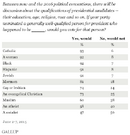dfx
Contributor
Here, be convincedI am not convinced that is true. It was a pretty open secret that Reagan was basically an atheist who papered over it for political reasons. And atheism is far more acceptable now than it was in the early 80s. Sure an openly atheist candidate would struggle today, but I don't think we are that far away. A gay President may take a little longer.

They do the same poll every few years or so and things are slowly improving, but it's still a pretty sad picture. Drrich2 here has sufficiently demonstrated how atheists are seen as inherently immoral (that is not to say outright evil) people and how this view is justified entirely through religious doctrine.
If it only were so easy. Being a member of a particular religion means that you believe at least some of its claims. The claims made by a particular religion come in a package. Now some people are stronger in their faith and believe more of these claims, others are weaker and only believe only some or fewer of them.The Bible is (in part) a moral code, or at least a record of moral codes (10 commandments, teachings of Jesus, etc.). But that code was written between 2,000 and 2,500 years ago, so it is scarcely surprising that it more closely reflects societal norms of the day. The rules it sought to impose were simple and basic, but in many cases were relatively enlightened in terms of its social background.
People who like to attack the Bible as hypocritical in modern times are shooting at straw men. You have to look at the emphasis of the teachings (love thy neighbour as thyself; do unto others, etc.) rather than the granular rules (prohibition of usury, levels of chastisement appropriate for spouses and slaves).
So far so good. Now the claims of a particular religion come in a variety of forms. You're right when you say that some are better and some are worse. Some are excellent, others completely inhumane. We can agree that "love thy neighbour" is a good one, and that claiming that slavery is OK is a bad one. But how do we know this? How can we make this determination? Surely not from the claims and teachings of the religion itself, because after all, it doesn't say that slavery is wrong, it says the exact opposite.
We know that slavery is wrong because of the moral code that our secular society has developed over centuries (and because of other things such as our own moral compass, but these are more difficult to address). We know these things anyway, we don't have to look at religion. In fact, we know these things in spite of what religion (well, this particular one) teaches. So why bother looking at the teachings of religion in the first place? What can it teach us that we don't already know anyway? If we have to look at the teachings of the religion and then determine which ones are good and which ones are bad, why not just skip the middle man and simply do what we already know is good and don't do what we know is bad?
The problem is that the stronger one's religious faith is, the more claims made by the religion are taken as truth, even in the face of contradicting evidence. Luckily our western secular society has put the lid on the slavery issue, but other issues, such as "homosexuality is a sin" are still very much alive and still have power to influence political decisions. And these issues are rooted entirely in religion.
Somewhat luckily for us, most Christians in the western world fall into the "weak faith" category, most of whom have never actually read their holy or only a few bits and pieces there and who are oblivious to the other atrocious claims made by their religion. Every once in a while though, there are people who get the (actually totally logical) idea that if they believe that what it says here, then they should also believe what it says over there, and develop into fundamentalists. This results in (for lack of a better word) abominations like the Westboro Baptist Church.
Of course some religions are better in this regard than others. Islam probably harbours the most harmful ideas of them all, but Christianity isn't far behind. A fundamentalist of Jainism on the other hand would hardly be a problem at all.
And for the record: in the bible slavery is not a mere "granular rule" as you say. "Love thy neighbour" is a single verse, but there are entire chapters dedicated to endorsing slavery.
The whole morality argument is one of the last pillars of religious apologetics, but it's a huge red herring.



